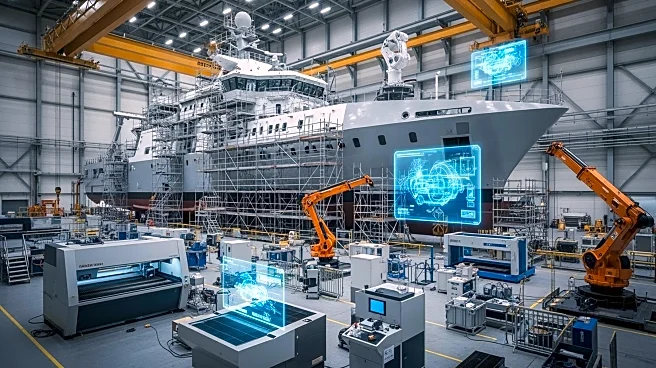What's Happening?
The National Oceanic and Atmospheric Administration (NOAA) has awarded a $95 million contract to JAG Alaska, Inc. for a mid-life renovation of the research vessel Oscar Dyson. This initiative is part of NOAA's
broader strategy to modernize its research fleet, extend the service life of its vessels, and incorporate sustainable maritime technologies. The renovation will include significant upgrades such as Siemens Energy's SISHIP BlueDrive PlusC low-voltage direct current propulsion system, which aims to enhance fuel efficiency and reduce emissions. The Oscar Dyson, commissioned in 2005, is crucial for conducting fisheries surveys and ecosystem assessments in Alaskan waters. The upgrades will also feature advanced generators, improved fire detection systems, and enhanced crew accommodations, ensuring the vessel's operational efficiency and scientific capabilities.
Why It's Important?
This investment underscores NOAA's commitment to sustainability and innovation in maritime operations. By upgrading the Oscar Dyson, NOAA not only enhances its research capabilities but also supports the local economy in Alaska through job creation. The use of advanced propulsion technology aligns with NOAA's environmental goals, setting a new standard for energy-efficient research vessels. This project highlights the importance of collaboration between government agencies and private industry to achieve technological advancements and operational excellence. The renovation of the Oscar Dyson is expected to bolster NOAA's leadership in ocean research and contribute to the sustainable management of marine resources.
What's Next?
The Oscar Dyson is expected to be ready for the 2028 field season, following the completion of its yearlong maintenance period. During this time, NOAA will modify the NOAA Ship Bell M. Shimada to ensure continuous data collection in Alaskan waters. This proactive approach will maintain the integrity of critical fisheries data collection. The successful implementation of the Oscar Dyson's upgrades could serve as a model for future renovations of NOAA's research fleet, promoting further advancements in sustainable maritime science.
Beyond the Headlines
The renovation of the Oscar Dyson represents a significant step towards integrating cutting-edge technology in maritime research. The collaboration between NOAA and Siemens Energy exemplifies how public-private partnerships can drive innovation and sustainability. This project may influence future policies and investments in maritime science, encouraging other organizations to adopt similar technologies. The focus on sustainability and efficiency could lead to long-term shifts in how research vessels are designed and operated, potentially impacting global maritime practices.









